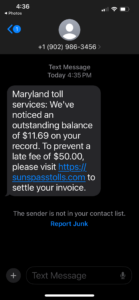Maryland Toll Services Scam Text: How to Protect Yourself
Beware of the Maryland Toll Services Scam Text
 If you’ve recently received a suspicious text message claiming to be from Maryland Toll Services, you’re not alone. Scammers are increasingly using text messages to target unsuspecting victims with fraudulent claims about unpaid tolls. Here’s what you need to know to protect yourself from falling victim to this scam. The MD
If you’ve recently received a suspicious text message claiming to be from Maryland Toll Services, you’re not alone. Scammers are increasingly using text messages to target unsuspecting victims with fraudulent claims about unpaid tolls. Here’s what you need to know to protect yourself from falling victim to this scam. The MD
What is the Maryland Toll Services Scam Text?
The Maryland Toll Services scam text is a phishing attempt where scammers send out messages pretending to be from the Maryland Transportation Authority (MDTA). These messages often claim that you have unpaid tolls and direct you to a fraudulent website to make a payment. The goal is to steal your personal information and, ultimately, your money.
How the Scam Works
 The Message: You receive a text message from what appears to be Maryland Toll Services or MDTA. The message claims that you have unpaid tolls and provides a link to a website where you can supposedly pay the outstanding amount. ( See the actual scam text that I recently received, which triggered me to write this blog)
The Message: You receive a text message from what appears to be Maryland Toll Services or MDTA. The message claims that you have unpaid tolls and provides a link to a website where you can supposedly pay the outstanding amount. ( See the actual scam text that I recently received, which triggered me to write this blog)- The Link: Clicking on the link takes you to a fake website designed to look like the official MDTA payment portal. This site may ask for personal information, such as your credit card number, address, and even your Social Security number.
- The Outcome: If you enter your information on the fraudulent site, scammers can use it to make unauthorized purchases, steal your identity, or access your bank accounts.
How to Identify a Maryland Toll Services Scam Text
Scammers are getting more sophisticated, but there are still some tell-tale signs that can help you identify a phishing attempt:
- Generic Greetings: Legitimate messages from MDTA will usually address you by name, whereas scam messages often use generic greetings like “Dear Customer.”
- Urgent Language: Be wary of messages that create a sense of urgency, such as “immediate action required” or “your account will be suspended.”
- Suspicious Links: Hover over the link (without clicking) to see where it leads. Official MDTA links will always start with “mdta.maryland.gov” or “ezpassmd.com.”
Steps to Take if You Receive a Maryland Toll Services Scam Text
If you receive a text message that you suspect is a scam, follow these steps to protect yourself:
- Do Not Click the Link: Avoid clicking on any links in the message. Instead, go directly to the official MDTA or E-ZPass Maryland website by typing the URL into your browser.
- Verify the Message: Contact MDTA or E-ZPass Maryland directly using a phone number or email address from their official website to verify whether the message is legitimate.
- Report the Scam: Forward the scam text to 7726 (SPAM) to report it to your mobile carrier. You can also report it to the FBI at https://www.ic3.gov/ and/or the Federal Trade Commission (FTC) at https://www.ftc.gov/complaint
- Monitor Your Accounts: Keep an eye on your bank and credit card statements for any unauthorized transactions. Consider setting up alerts for unusual activity.
Why Scams Like This are on the Rise
Scammers are constantly evolving their tactics to exploit new technologies and social trends. The rise in the use of smartphones and online payments has given scammers new avenues to target potential victims. Text messages are particularly effective because they feel more personal and immediate than email, and people are often less cautious when interacting with them.
How to Protect Yourself in the Future
Here are some tips to help you avoid falling victim to similar scams in the future:
- Be Skeptical: Always question unexpected messages, especially those requesting personal information or payment.
- Secure Your Information: Never share sensitive information, such as your Social Security number or credit card details, through text message or email.
- Keep Software Updated: Ensure your phone and computer software are up to date to protect against malware and other security threats.
- Use Strong Passwords: Use unique, complex passwords for different accounts and consider using a password manager.
Conclusion
The Maryland Toll Services scam text is a reminder to remain vigilant about the information you receive and share online. By being aware of the signs of phishing attempts and taking proactive steps to protect your personal information, you can help safeguard yourself against these and other types of scams.
Always remember, if something seems suspicious, it probably is.
Stay safe and informed!
